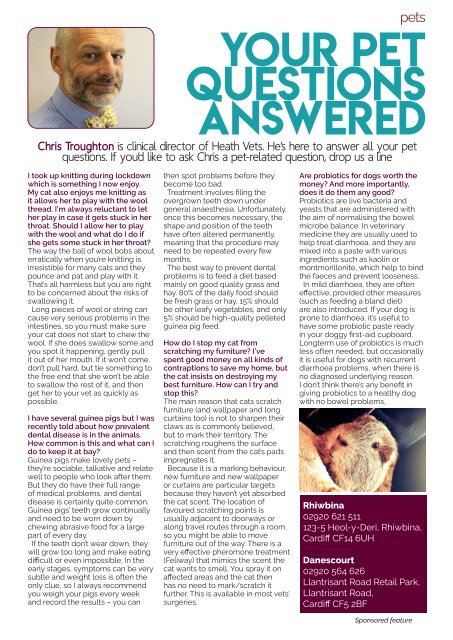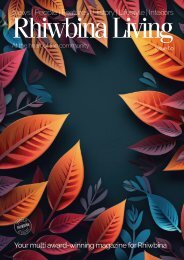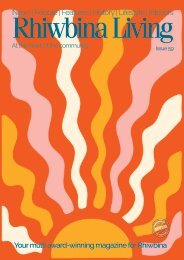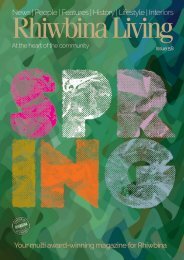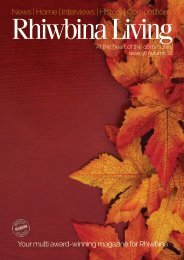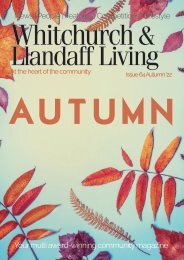Whitchurch and Llandaff Living Issue 61
Winter 21/22 issue of the award-winning Whitchurch and Llandaff Living.
Winter 21/22 issue of the award-winning Whitchurch and Llandaff Living.
Create successful ePaper yourself
Turn your PDF publications into a flip-book with our unique Google optimized e-Paper software.
pets<br />
Your pet<br />
questions<br />
answered<br />
Chris Troughton is clinical director of Heath Vets. He’s here to answer all your pet<br />
questions. If you’d like to ask Chris a pet-related question, drop us a line<br />
I took up knitting during lockdown<br />
which is something I now enjoy.<br />
My cat also enjoys me knitting as<br />
it allows her to play with the wool<br />
thread. I’m always reluctant to let<br />
her play in case it gets stuck in her<br />
throat. Should I allow her to play<br />
with the wool <strong>and</strong> what do I do if<br />
she gets some stuck in her throat?<br />
The way the ball of wool bobs about<br />
erratically when you’re knitting is<br />
irresistible for many cats <strong>and</strong> they<br />
pounce <strong>and</strong> pat <strong>and</strong> play with it.<br />
That’s all harmless but you are right<br />
to be concerned about the risks of<br />
swallowing it.<br />
Long pieces of wool or string can<br />
cause very serious problems in the<br />
intestines, so you must make sure<br />
your cat does not start to chew the<br />
wool. If she does swallow some <strong>and</strong><br />
you spot it happening, gently pull<br />
it out of her mouth. If it won’t come,<br />
don’t pull hard, but tie something to<br />
the free end that she won’t be able<br />
to swallow the rest of it, <strong>and</strong> then<br />
get her to your vet as quickly as<br />
possible.<br />
I have several guinea pigs but I was<br />
recently told about how prevalent<br />
dental disease is in the animals.<br />
How common is this <strong>and</strong> what can I<br />
do to keep it at bay?<br />
Guinea pigs make lovely pets –<br />
they’re sociable, talkative <strong>and</strong> relate<br />
well to people who look after them.<br />
But they do have their full range<br />
of medical problems, <strong>and</strong> dental<br />
disease is certainly quite common.<br />
Guinea pigs’ teeth grow continually<br />
<strong>and</strong> need to be worn down by<br />
chewing abrasive food for a large<br />
part of every day.<br />
If the teeth don’t wear down, they<br />
will grow too long <strong>and</strong> make eating<br />
difficult or even impossible. In the<br />
early stages, symptoms can be very<br />
subtle <strong>and</strong> weight loss is often the<br />
only clue, so I always recommend<br />
you weigh your pigs every week<br />
<strong>and</strong> record the results – you can<br />
then spot problems before they<br />
become too bad.<br />
Treatment involves filing the<br />
overgrown teeth down under<br />
general anaesthesia. Unfortunately,<br />
once this becomes necessary, the<br />
shape <strong>and</strong> position of the teeth<br />
have often altered permanently,<br />
meaning that the procedure may<br />
need to be repeated every few<br />
months.<br />
The best way to prevent dental<br />
problems is to feed a diet based<br />
mainly on good quality grass <strong>and</strong><br />
hay. 80% of the daily food should<br />
be fresh grass or hay, 15% should<br />
be other leafy vegetables, <strong>and</strong> only<br />
5% should be high-quality pelleted<br />
guinea pig feed.<br />
How do I stop my cat from<br />
scratching my furniture? I’ve<br />
spent good money on all kinds of<br />
contraptions to save my home, but<br />
the cat insists on destroying my<br />
best furniture. How can I try <strong>and</strong><br />
stop this?<br />
The main reason that cats scratch<br />
furniture (<strong>and</strong> wallpaper <strong>and</strong> long<br />
curtains too) is not to sharpen their<br />
claws as is commonly believed,<br />
but to mark their territory. The<br />
scratching roughens the surface<br />
<strong>and</strong> then scent from the cat’s pads<br />
impregnates it.<br />
Because it is a marking behaviour,<br />
new furniture <strong>and</strong> new wallpaper<br />
or curtains are particular targets<br />
because they haven’t yet absorbed<br />
the cat scent. The location of<br />
favoured scratching points is<br />
usually adjacent to doorways or<br />
along travel routes through a room,<br />
so you might be able to move<br />
furniture out of the way. There is a<br />
very effective pheromone treatment<br />
(Feliway) that mimics the scent the<br />
cat wants to smell. You spray it on<br />
affected areas <strong>and</strong> the cat then<br />
has no need to mark/scratch it<br />
further. This is available in most vets’<br />
surgeries.<br />
Are probiotics for dogs worth the<br />
money? And more importantly,<br />
does it do them any good?<br />
Probiotics are live bacteria <strong>and</strong><br />
yeasts that are administered with<br />
the aim of normalising the bowel<br />
microbe balance. In veterinary<br />
medicine they are usually used to<br />
help treat diarrhoea, <strong>and</strong> they are<br />
mixed into a paste with various<br />
ingredients such as kaolin or<br />
montmorillonite, which help to bind<br />
the faeces <strong>and</strong> prevent looseness.<br />
In mild diarrhoea, they are often<br />
effective, provided other measures<br />
(such as feeding a bl<strong>and</strong> diet)<br />
are also introduced. If your dog is<br />
prone to diarrhoea, it’s useful to<br />
have some probiotic paste ready<br />
in your doggy first-aid cupboard.<br />
Longterm use of probiotics is much<br />
less often needed, but occasionally<br />
it is useful for dogs with recurrent<br />
diarrhoea problems, when there is<br />
no diagnosed underlying reason.<br />
I don’t think there’s any benefit in<br />
giving probiotics to a healthy dog<br />
with no bowel problems.<br />
Rhiwbina<br />
02920 621 511<br />
123-5 Heol-y-Deri, Rhiwbina,<br />
Cardiff CF14 6UH<br />
Danescourt<br />
02920 564 626<br />
Llantrisant Road Retail Park,<br />
Llantrisant Road,<br />
Cardiff CF5 2BF<br />
Sponsored feature


